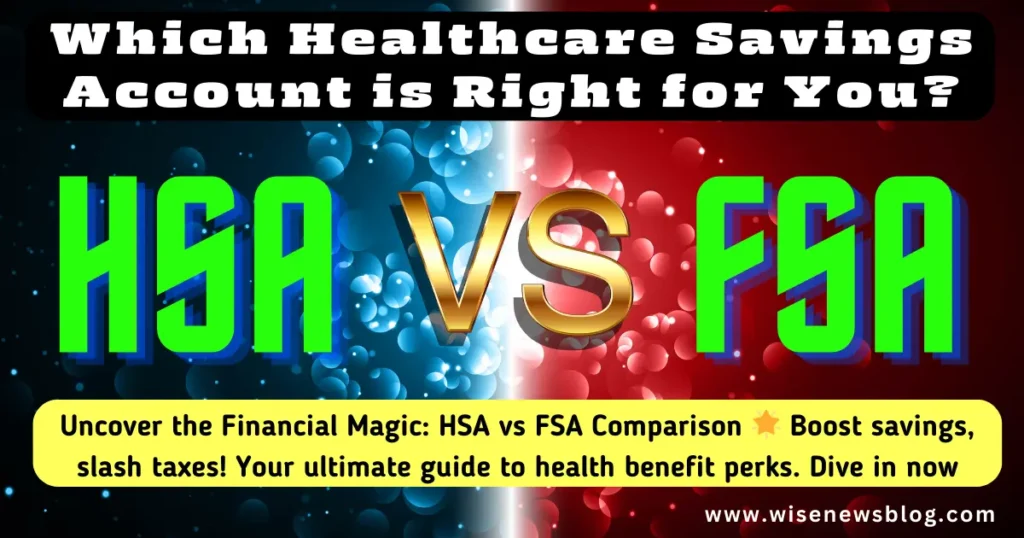You have definitely heard about Health Savings Accounts (HSAs) and Flexible Spending Accounts (FSAs). But few know the difference between them. This blog post explores the HSA VS FSA comparison in detail and covers eligibility, contribution limits, tax benefits, investment options, and withdrawal rules for both accounts. Understanding these distinctions will help you make an informed choice, ensuring you select the right account to save money on your medical expenses.

1. Why You Need to Compare HSA and FSA?
Comparing the advantages of Health Savings Accounts (HSA) and Flexible Spending Accounts (FSA) is essential for individuals to make informed decisions about their healthcare financial planning. Here’s why it’s necessary:
- Financial Planning:
- Understanding the advantages helps individuals plan for their medical expenses effectively.
- Knowing the differences assists in selecting the account that aligns with personal financial goals.
- Eligibility Considerations:
- Comparing eligibility criteria helps individuals determine which account they qualify for based on their specific situation.
- This ensures that individuals don’t contribute to an account they are not eligible for, avoiding complications.
- Contribution Limits:
- Knowing the contribution limits allows individuals to budget for healthcare expenses and maximize tax benefits.
- It helps in making contributions within legal limits, avoiding potential penalties.
- Tax Benefits:
- Understanding the tax advantages of each account aids in maximizing potential tax savings.
- It allows individuals to align their healthcare savings strategy with their overall tax planning.
- Investment Options:
- For those interested in growing their healthcare savings, knowledge about investment options is crucial.
- Comparing HSA’s investment flexibility with FSA’s limitations informs individuals about potential long-term growth.
- Withdrawal Rules:
- Awareness of withdrawal rules ensures individuals can access funds when needed without unexpected restrictions.
- It helps in avoiding potential forfeitures or penalties due to a lack of understanding.
- Employment Considerations:
- Individuals employed by companies offering FSAs need to understand the benefits available to them.
- Those with the option to choose between HSA and FSA can make decisions that align with their healthcare needs and employment situation.
- Overall Cost Management:
- By comparing advantages, individuals can better manage their healthcare costs, optimizing the benefits offered by each account.
- It aids in creating a comprehensive strategy for handling medical expenses efficiently.
2. Comparing HSA and FSA Advantages
As we have understood comparing the advantages of HSA and FSA is essential for individuals to make well-informed choices tailored to their specific circumstances, ensuring effective healthcare financial management.
Let’s break down the perks of each to make it easier for you to pick the one that suits your needs.
2.1. HSA Vs FSA Eligibility Comparison:
Health Savings Accounts (HSAs):
- Who qualifies: Individuals with a high-deductible health plan (HDHP).
- Conditions: You must be covered by an HDHP and cannot be enrolled in Medicare or claimed as a dependent on someone else’s tax return.
- Key point: HSAs are tied to specific health insurance plans with higher deductibles.
Flexible Spending Accounts (FSAs):
- Who qualifies: Employees working for an employer offering an FSA plan.
- Conditions: Available regardless of the type of health insurance coverage you have.
- Key point: FSAs are associated with the employer; if your employer provides an FSA plan, you’re eligible.
Other Important Resources Related to the Topic
Here are some resources that you can use to learn more about HSA and FSA:
- IRS Publication 969: This publication explains the various tax-advantaged programs that can help you offset healthcare costs, including HSAs, Medical Savings Accounts (MSAs), and Health Flexible Spending Arrangements (FSAs).
- CNBC article on HSA and FSA: This article provides an overview of the benefits, drawbacks, and eligibility requirements of HSAs and FSAs.
- Forma blog post on HSA and FSA compatibility: This blog post provides guidance and compliance factors for employers who want to offer HSA and FSA-compatible programs.

